2020-ongoing Nío Nę P’ęnę́ – Trails of Mountain Caribou
In the year 2020, Ɂehdzo Got’ı̨nę Gots’ę́ Nákedı- Sahtú Renewable Resources Board (SRRB) partnered with Canadian Mountain Network to introduce the Nı́o Nę P'ęnę́ - Trails of the Mountain Caribou: Renewing Indigenous Relationships in Conservation research project. This five-year Indigenous-led program involves researching the relationship between Indigenous well-being and caribou conservation in the Mackenzie Mountain area of the Sahtú Region, NWT and has partners from Tulı́t'a, Norman Wells, and Ross River. For the Shúhtaot’ı̨nę (Mountain Dene) of Tulı́t'a and Norman Wells, Nı́o Nę P’ęnę́ encompasses all of nature, and it’s what holds everything together and attracts wildlife. This area has been a gathering place for people and caribou for thousands of years. In 2014, these communities partnered to develop a plan for research, monitoring, and land protection that would help them achieve their vision for keeping Dene language, Dene ways of life, and Dene law strong in co-existence with caribou. Successive meetings between 2016 and 2019 led to the Nío Nę P’ęnę Begháré Shúhta Goɂepę́ Narehɂá - Trails of the Mountain Caribou Plan. Led by Leon Andrew (Sahtú Renewable Resources Board), and leaders from Tulı́t'a and Norman Wells Ɂehdzo Got'ı̨nę - Renewable Resources Councils, and guided by the Nı́o Nę P’ęnę́ Working Group, the research combines Indigenous methodologies and knowledge with respectful non-invasive science-based caribou populations and landscape research to contribute to the community vision and objectives for caribou conservation and community well-being, cultural resurgence and governance in the mountains.

Photo credit- Pierre-Emmanuel Chaillon
With the growing interest in this project and seeing an opportunity to connect with our neighbours who are our natural partners in terms of relationship with communities within and outside the Sahtú region and also because of the ecological connection along the backbone of mountain ranges in Nı́o Nę P'ęnę́ area, the Nı́o Nę P'ęnę́ - Trails of the Mountain Caribou Hub was introduced in the year 2021. To summarize, the Hub research expanded on the ongoing research project, Trails of the Mountain Caribou: Renewing Indigenous Relationships in Conservation.
The Nı́o Nę P’ęnę́ Hub is structured by ancient trails across northwestern mountain landscapes that intertwine cold climate families, nations, wildlife, and water flows first disrupted by the imposition of colonial boundaries and governance systems, and then counterpoised by modern treaties and Indigenous governance systems. These mountain landscapes, home to people, caribou and other wildlife, are now impacted in drastic ways by climate change and socio-economic pressures.
The Hub supports a resurgence of knowledge-sharing by Dene, Métis, scientists, and long-term inhabitants and harvesters, including outfitters, and nurtures collaborative stewardship relationships stretching across treaties and other political boundaries. The Hub enables the maintenance and strengthening of relationships radiating in three directions, reflected in three nodes. The three nodes encompassed by the larger Hub are as follows:
- A northern node, encompassing the neighbouring Sahtú community of Fort Good Hope Shı́hta Got’ı̨nę (Mountain Dene) and the mountain regions of the newly established Ts’udé Nılı̨né Tuyeta Protected Area, Gwich'in communities as represented by the Gwich'in Tribal Council (GTC), and the Nacho Nyak Dun Nation (Mayo, Yukon).
- A central node, encompassing the longstanding community relationships between Tulı́t’a, Norman Wells and Tu Łidlini Dena (Ross River, Yukon).
- A southern node, encompassing Nahanni and Nááts'įhch'oh National Park Reserves, and relationships with Dehcho First Nation communities.
The anticipated outcome from both the research project and Hub will be a body of evidence supporting the biocultural and socioeconomic significance of the Nı́o Nę P’ęnę́ area, a framework for caribou conservation and habitat protection. Furthermore, it will support the establishment of Indigenous-led Guardian and land protection initiatives and will help in setting a standard for defining the nature of such initiatives in Canada. The research project and Hub addresses three themes: Ways of Being, Ways of Doing, and Indigenous Resurgence through five ongoing special projects (SP) initiated through the partnership of communities within and outside Sahtú.

Photo credit- Pierre-Emmanuel Chaillon
The projects include: (SP1) Following trails of the caribou: genetic-based research on northern mountain caribou to characterize the population genetic structure and diversity; (SP2) Understanding caribou landscapes: remote sensing-based research to characterize the biophysical aspects of northern mountain caribou habitat and to quantify ecological changes occurring within these regions; (SP3) Mapping knowledge: interviews and participatory mapping approaches using Indigenous and outfitters knowledge to characterize the state of knowledge about northern mountain caribou population and herd sizes, movement and distribution patterns, as well as observations of basic biology, behaviour, health, habitat use, and threats, and establishing an Geospatial (GIS) Hub for community members and partners which aims to support the technical needs of the Nı́o Nę P’ęnę́ area; (SP4) Livelihoods and climate change: Sustainable Livelihoods research to document local aspirations and perspectives on conservation and development through the lens of day-to-day lives in the context of climate change and community planning. (SP5) Renewing governance: Action research exploring innovative frameworks and approaches for Indigenous governance, including Indigenous Protected Areas, Guardians, and community planning.
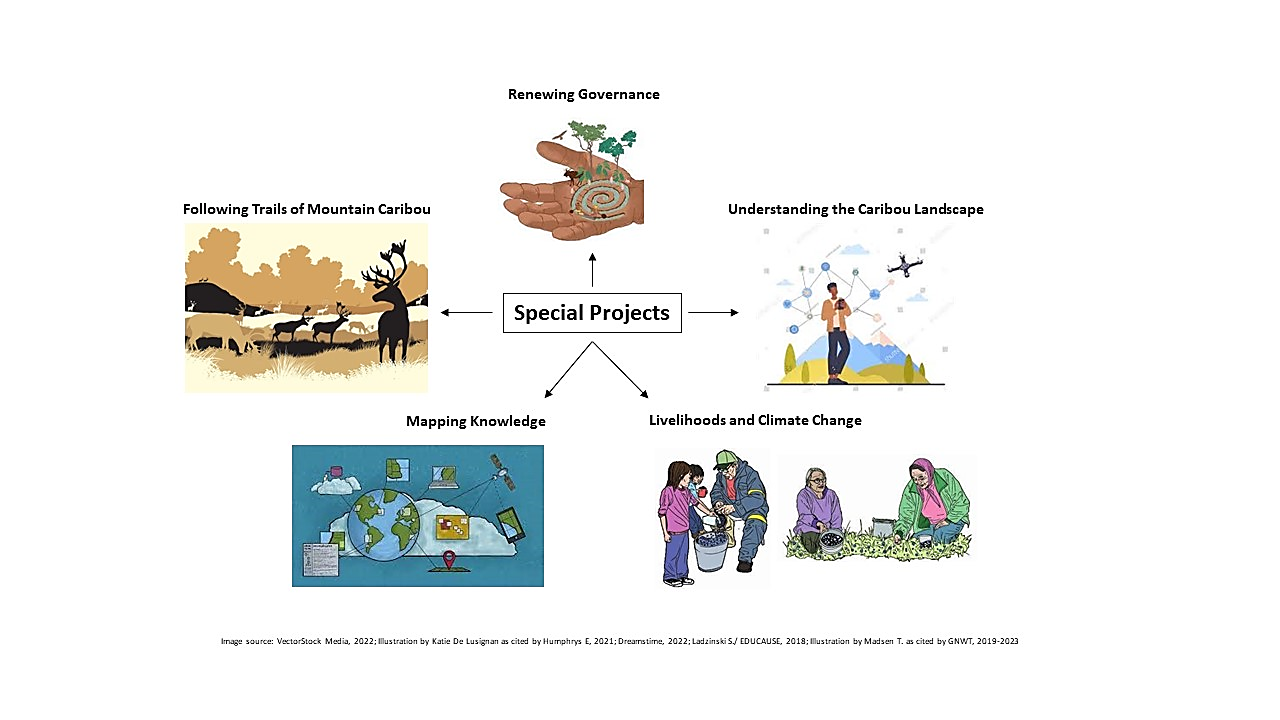
- SP1: Following Trails of Mountain Caribou- This ongoing research being conducted in the Mackenzie Mountains focuses on Shúhta goɂepę́ (Northern Mountain Caribou) and aims to bring together local indigenous knowledge and genetic analysis to investigate questions of importance to Indigenous and Métis of the Sahtú. This research project is looking at the fine scale structure and connectivity, both in the past and present, of Shúhta goɂepę́ in the Sahtú region of the Mackenzie Mountains. The genetic information gained through this research is being used to investigate how Shúhta goɂepę́ are related to each other in the mountains by looking at family relationships such as mother, father, siblings, and grandparents between the individual caribou. The research will also exhibit how caribou move around the mountains by comparing the locations of parents/grandparents to their offspring as well as comparing the locations of siblings. This research is being conducted using a collaborative community-led approach; by doing so, this research will be grounded in both scientific and Indigenous knowledge, will be ethically produced, and will build capacity within the community. This knowledge will help ensure the long-term success and health of shúhta goɂepę́. This research is being conducted in partnership with Environment and Climate Change Canada and Trent University and being led by Dr. Micheline Manseau, along with Cory Fournier.
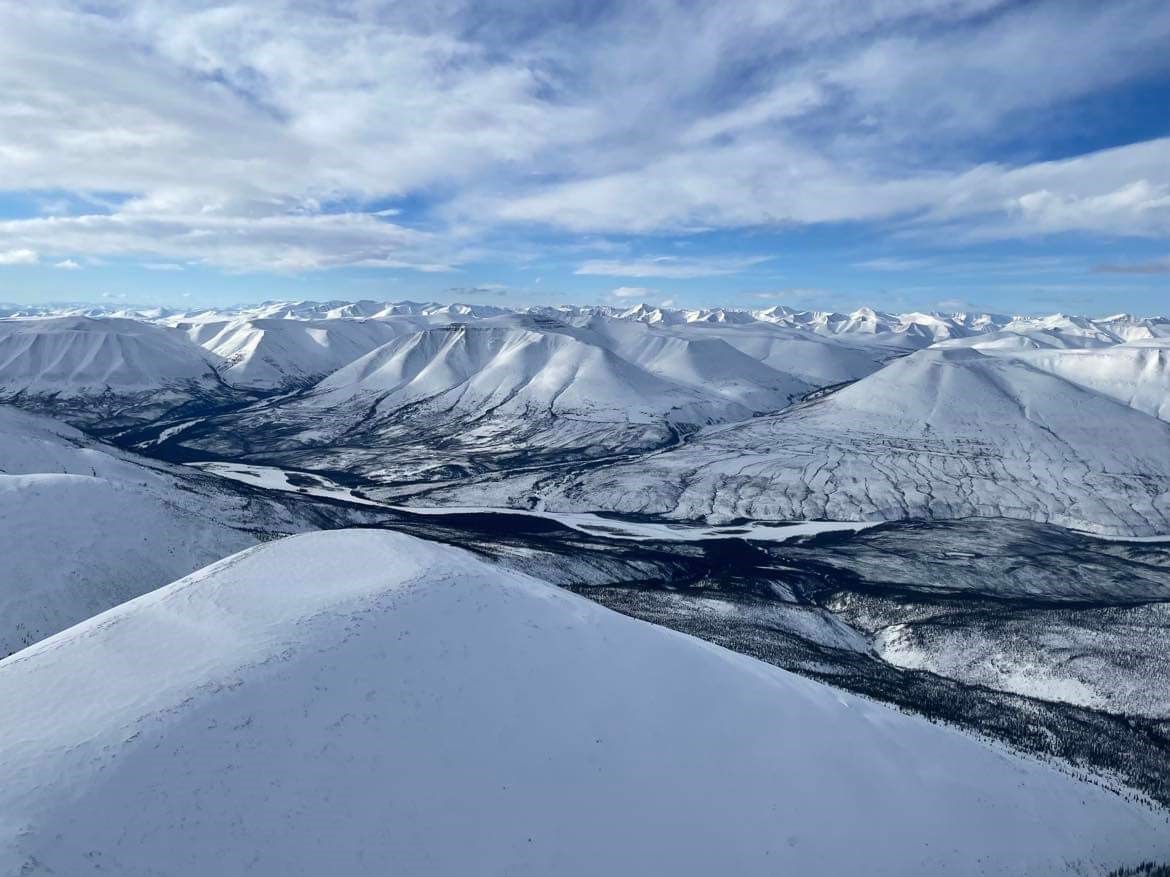
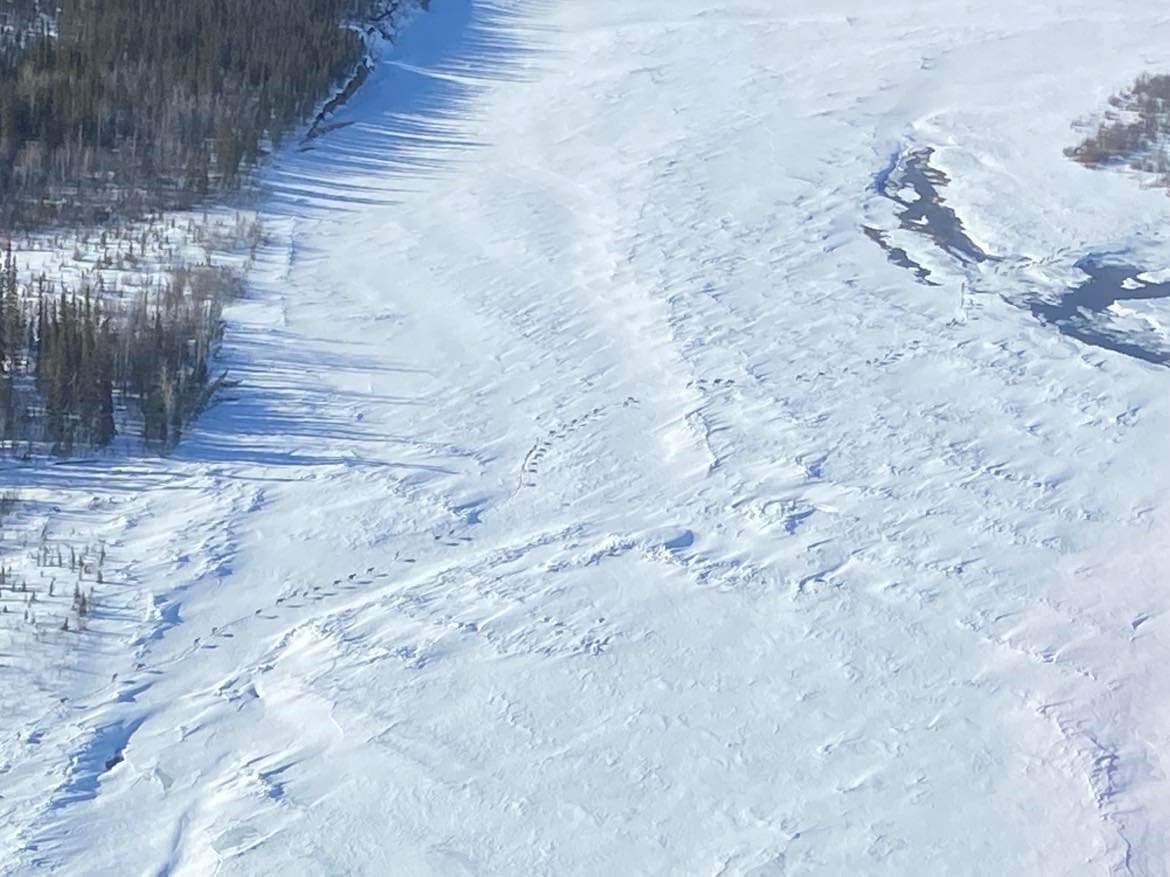
Photo credit- Alyssa Bougie (Left- Mackenzie Mountain ranges; Right- Trails of Mountain caribou as observed from the chopper)
- SP2: Understanding the Caribou Landscape- In partnership with Environment and Climate Change Canada, this research, led by Blair Kennedy, examines changes in landscape cover and vegetation types across the Northwest Territories, primarily via remote-sensing and aerial photography. The fieldwork portion of the research is a pilot, which will allow for on-the-ground comparison and analysis to verify remote-sensing data. This will primarily be done using drone photography and vegetation transect sampling. The objective of this research in 2022 if to capture field data to support the mapping and monitoring of northern mountain caribou critical habitat (including the characterization of caribou forage) within the Mackenzie Mountains. The research work will involve the collection of ground cover data in the form of ground sample plots, ground photographs, and drone imagery where applicable.
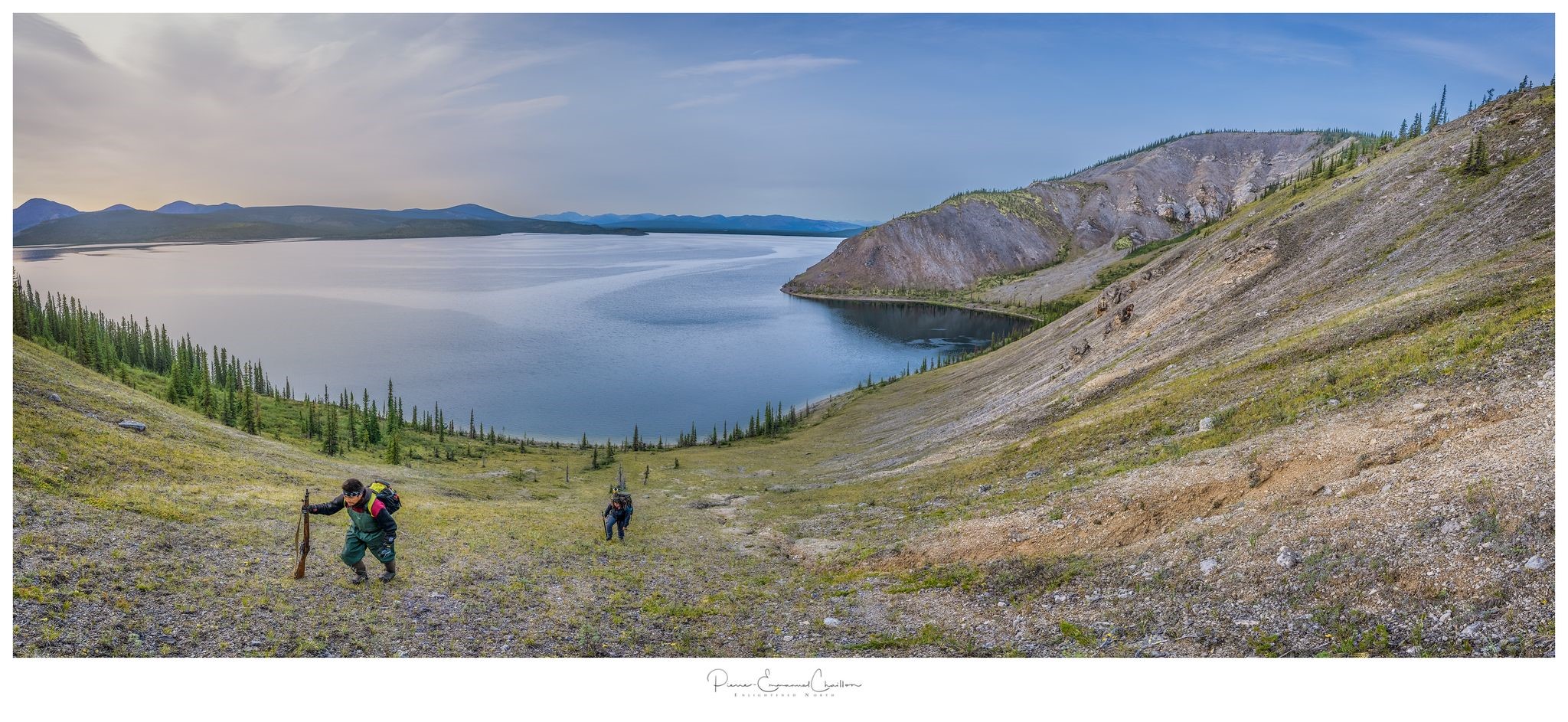
Photo credit- Pierre-Emmanuel Chaillon
- SP3: Mapping Knowledge- In partnership with Nature United and being led by Tracey Williams, Rick Tingey, and Manisha Singh, this project aims to build a visual landscape tool, also known as a Geospatial (GIS) hub, for community members and partners. This tool will help enhance the accessibility, visibility, and overall understanding of the health and wellness of the wildlife, their habitat, people, and place that is the Nı́o Nę P’ęnę́ area. This tool will also aim to bring the knowledge of current collaborations between partners of the Nı́o Nę P’ęnę́ Hub to have an additional accessible tool that would enhance those collaborations and also for continued use of land and its resources in a good way and with wildlife, habitat, people, and the area healthy and thriving. The GIS hub is a technical vision for the continuation and the perpetuation of Dene & Métis peoples Way of Life in the Nío Nę P' ęnę shared homeland.
- SP4: Livelihoods and Climate Change- Being led by Ph.D. candidate Kimberleigh Schultz, McMaster University, this research employs collaborative, participatory Indigenous research methods to explore perspectives on conservation and development in the communities of Tulı́t’a and Norman Wells through the lens of peoples’ livelihoods – meaning the ways people make a living both day to day, and over the long-term. This research explores questions of importance to Dene and Métis in Tulı́t’a District, including perspectives on conservation and mining, and how these different opportunities are considered in the context of climate change in the region. It also involves discussion of the different strategies people use to make a living from day to day, and what they want for the long-term. These questions about peoples’ livelihoods speak to the role of ‘mixed economies’ in the north, recognizing that both monetary income and hunting and harvesting are an important part of the regional economy.
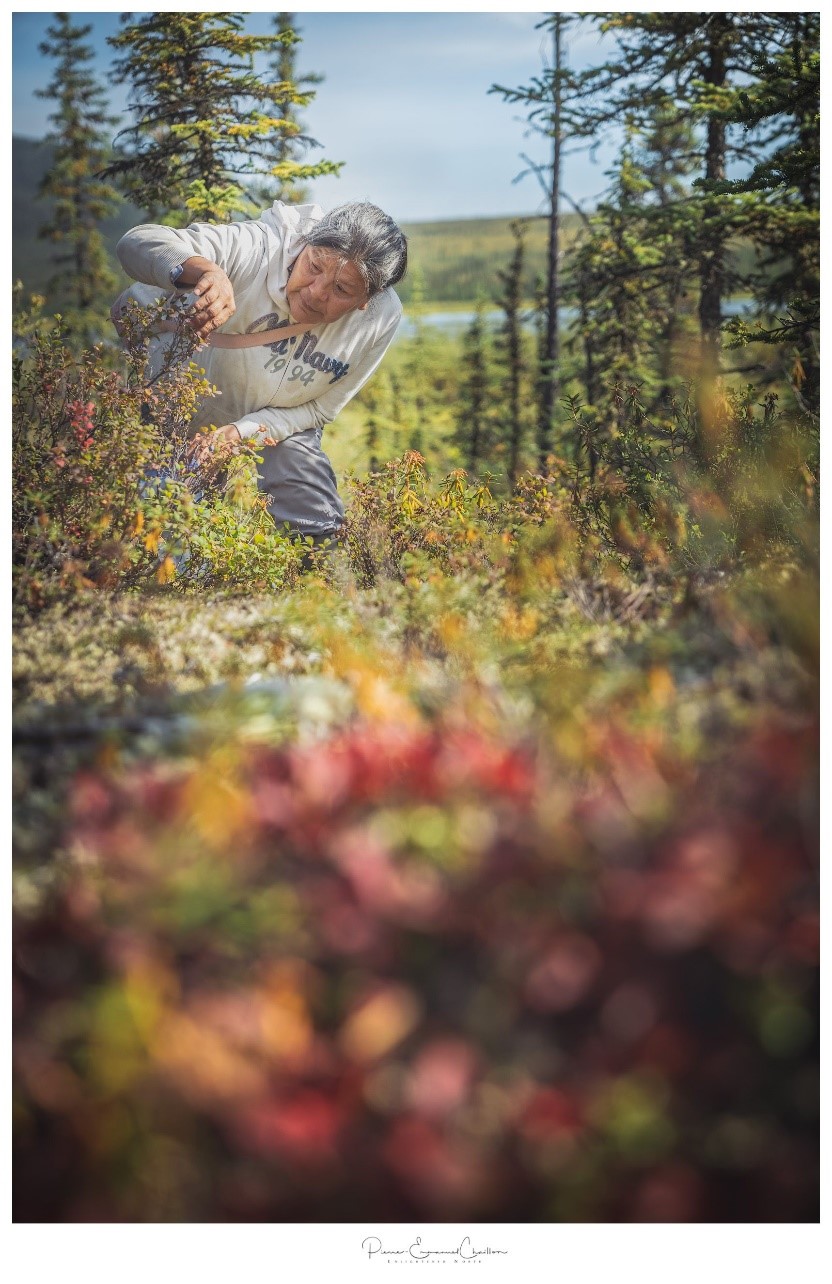
Photo credit- Pierre-Emmanuel Chaillon
- SP5: Renewing Governance- This research involves action research exploring innovative frameworks and approaches for Indigenous governance, including Indigenous Protected Areas, Guardians, and community planning.
Team members, partners, and collaborators
- Team members
- Leon Andrew, Research Director, Ɂehdzo Got'ı̨nę Gots'ę́ Nákedı (SRRB)
- Deborah Simmons, Executive Director, Ɂehdzo Got'ı̨nę Gots'ę́ Nákedı (SRRB)
- Manisha Singh, Nı́o Nę P'ęnę́ Research Manager, Ɂehdzo Got'ı̨nę Gots'ę́ Nákedı (SRRB)
- Tracey Williams, Northwest Territories Program Director, Nature United
- Rick Tingey, GIS Analyst, Data Engineer, and Web GIS Developer
- Micheline Manseau, Research Scientist, Environment and Climate Change Canada
- Blair Kennedy, Remote Sensing Scientist, Environment and Climate Change Canada
- Cory Fournier, Masters candidate, Trent University
- Kim Schultz, PhD candidate, McMaster University
- Partners and collaborators
- ALCES Landscape & Land-Use Ltd.
- Association of Mackenzie Mountain Outfitters
- Department of Education, Culture, and Employment, Prince of Wales Heritage Centre, Government of Northwest Territories
- Department of Environment and Natural Resources, Government of Northwest Territories
- Department of Industry, Tourism and Investment, Government of Northwest Territories
- Environment and Climate Change Canada
- Fort Good Hope Metis Land Corporation
- Fort Good Hope Renewable Resources Council
- Gwich'in Tribal Council, Department of Cultural Heritage
- Nááts'ı̨hch'oh National Park Reserve
- Nacho Nyak Dun First Nation
- Nahanni National Park Reserve
- Nature United
- Nę K'ǝ Dene Ts'ı̨lı̨ - Living on the Land Forum
- Norman Wells Ɂehdzo Got'ı̨nę (Renewable Resources Council)
- Polar Continental Shelf Program
- Ɂehdzo Got’ı̨nę Gots’ę́ Nákedı (Sahtú Renewable Resources Board)
- Trent University
- Tu Łidlini (Ross River) Dena Council
- Tulít'a Dene Band
- Tulı́t'a Métis Land Corporation
- Tulı́t’a Ɂehdzo Got'ı̨nę (Renewable Resources Council)
- Yellowstone to Yukon Conservation Initiative
Funders
Canadian Mountain Network, Climate Change and Health Adaptation Program, Ducks Unlimited, Environment and Climate Change Canada, Lawson Foundation, Nature United, Tides Canada, Yellowstone to Yukon
Publications
Mapping historical changes to alpine extent and treeline ecotones across the greater Mackenzie Mountains, Northwest Territories. Arctic Science 7, 1 (March 2021) – Abstract submission
Nío Nę P’ęnę́ Begháré Shúhta Goɂepę́ Narehɂá - Trails of the Mountain Caribou, June 23, 2021- Canadian Mountain Network Summit
Community- led Planning for Caribou: Changing How We Do Conservation, March 23, 2022- Indigenous Knowledge Circle of the NBCKC and Sahtu Renewable Resources Board
Reports
spreadsheet Annual Research Progress Table, 2021-2022(19 KB)
spreadsheet Annual Research Progress Table, 2021-2022 (Hub)(15 KB)
Project Budget
$1,625,825
